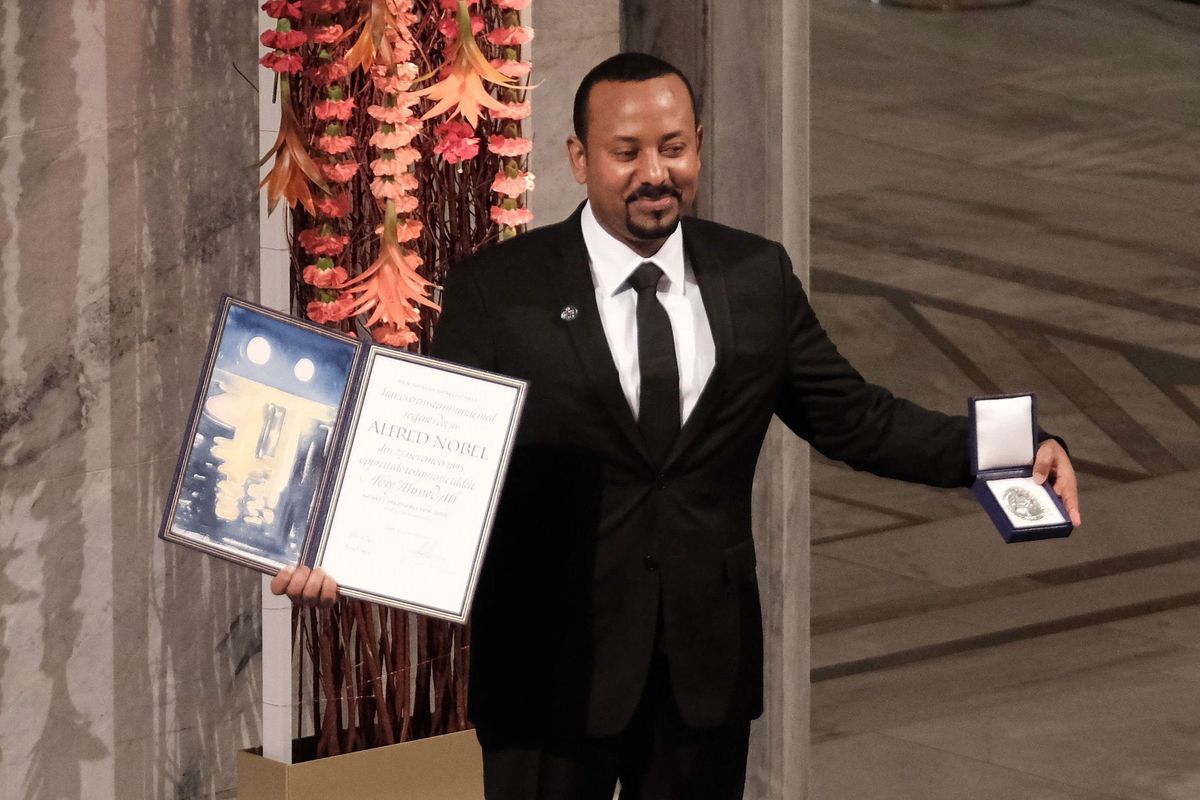Ethiopia’s Prime Minister Abiy Ahmed Accepts Nobel Peace Prize Amidst Wave of Protest
The leader, who has been called a 'reformist' has been met with criticism from those who believe his efforts have not brought about tangible change.

Following the announcement of his win October, Ethiopia's Prime MinisterAbiy Ahmed formally received his Nobel Peace Prize during the award ceremony in Oslo, Norway on Tuesday for his efforts to "achieve peace and international cooperation."
During his lecture, Ahmed addressed the ongoing quest for "peace," which he has been credited for fostering between Ethiopia and neighboring Eritrea following two decades of hostility between the two nations.
"For me, nurturing peace is like planting and growing trees," said Ahmed in his speech. "Just like trees need water and good soil to grow, peace requires unwavering commitment, infinite patience, and good will to cultivate and harvest its dividends." Ahmed was praised by chairperson of the Nobel Committee, Berit Reiss-Andersen, for representing a "new generation of African leaders who realise that conflict must be resolved by peaceful means."
However many pro-democracy observers have remained critical of the leader who has been described as a "reformist" by international press. While he has been hailed for bringing about social changes related to gender equality in his cabinet, environmentalism and other political reforms, many believe that his efforts have not had real impact on the ground. Critics point to the ongoing ethnic clashes in Ethiopia as a primary example of where Ahmed has fallen short.
In October, just weeks after the award was announced, hundreds of Ethiopians in the Oromia region and in the capital Addis Ababa, took to the streets in protest and burned several copies of Ahmed's book.
According to the BBC, several Eritrean demonstrators gathered outside of the ceremony in Oslo on Tuesday to protest Ahmed's award, claiming that the impact of the peace deal have not had tangible impact.
Ahmed controversially, did not take any questions from Norwegian press as is normally expected of recipients. His press secretary claimed this due to his "busy working schedule" and "humble disposition."
Ahmed, the youngest head of government in Africa, joins other notable Africans who have been awarded the Nobel Peace Prize including Desmond Tutu, Kofi Annan and Nelson Mandela.
- Thousands of Ethiopians Showed Up for the Oromo People's ... ›
- The Army Has Been Deployed to Ethiopia's Oromia Region Amid ... ›
- Ethiopia's New Cabinet is Made Up of 50 Percent Women - OkayAfrica ›
- Sahle-Work Zewde Becomes Ethiopia's First Female President ... ›
- Ethiopia's Prime Minister Abiy Ahmed has Been Awarded the Nobel ... ›
- Hundreds of Ethiopians are Protesting Against Prime Minister Abiy ... ›
- Ethiopia Declares a State of Emergency Amid Rising Regional Attacks - OkayAfrica ›
- Ethiopian Prime Minister Gives Tigray 72 Hours to Surrender Amidst Rising Attacks - OkayAfrica ›
- Sibusiso Innocent Zikode Awarded Global Human Rights Prize - OkayAfrica ›
- Sibusiso Innocent Zikode Awarded Global Human Rights Prize - OkayAfrica ›
- Heavy Is the Head: The Trials of Abiy Ahmed - OkayAfrica ›
- Ethiopian Crisis is 'A Stain On Our Conscience' Says UN Official ›
- Ethiopian Prime Minister Abiy Ahmed Sworn in For 5 More Years - OkayAfrica ›
- Ethiopia's #BringBackOurStudents Takes to the Streets - OkayAfrica ›
- Ethiopia's Abiy Ahmed Responds to Trump's Claims of Nobel Peace Prize Snub - OkayAfrica ›
- These Two Young African Women Were Nominated for the Nobel Peace Prize - Okayplayer ›

